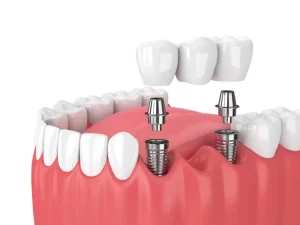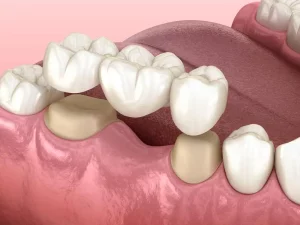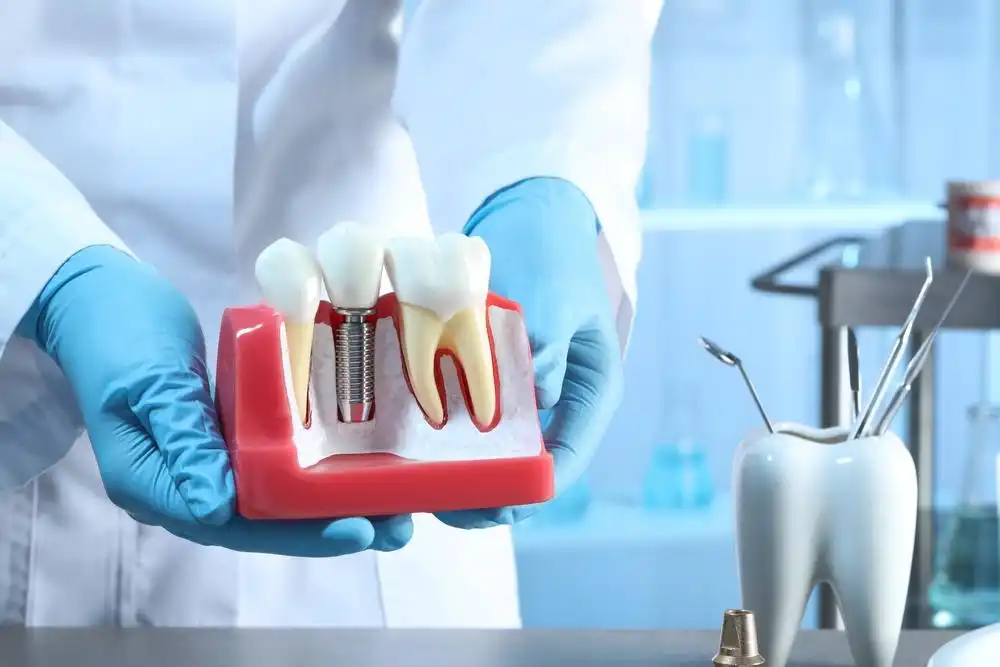What Causes Tooth Sensitivity After Dental Crowns?
Uncategorized
What Causes Tooth Sensitivity After Dental Crowns or Dental Bridges?
Dental crowns and dental bridges are invaluable aspects of restorative dentistry. They offer solutions to various dental issues. However, a common concern for some individuals is the post-procedural tooth sensitivity. In this blog, we will explore the causes, triggers, duration, symptoms, and effective strategies for minimising tooth sensitivity after the placement of dental crowns and dental bridges.
What Causes Tooth Sensitivity After Crowns and Dental Bridges?

Tooth sensitivity after the placement of crowns and bridges can arise from various factors related to the dental procedure. Understanding these causes is vital for patients and dentists. It helps them to manage and address the issues effectively. Some factor that causes tooth sensitivity are:
- Nerve Irritation: The process of preparing and placing dental crowns and bridges may irritate the tooth’s nerves. This initial irritation can cause temporary sensitivity. It usually subsides over time.
- Altered Bite Mechanics: Changes in the alignment or bite mechanics due to the introduction of crowns and bridges can cause sensitivity. Ensuring precise adjustments during the placement is vital for minimising this issue.
- Microleakage: Inadequate sealing of the crown or bridge margins can allow fluids and bacteria to penetrate underneath. This microleakage can irritate the tooth’s nerves. Ensuring a proper fit and seal during the placement is important to prevent this issue.
- Dental Material Selection: The choice of materials for crowns and bridges can influence sensitivity. Some materials conduct temperature more effectively than others. It impacts how the teeth respond to hot or cold stimuli.
- Pre-existing Dental Issues: Patients with pre-existing dental problems, like gum disease or cavities, may experience sensitivity after crown or bridge placement. Addressing these issues before the procedure is essential to minimise postoperative discomfort.
- Individual Healing Response: Everyone’s body reacts differently to dental procedures. Some may experience transient sensitivity, while others may take more time to adapt. Factors like overall health and immune response can influence the healing process.
It’s important to note that post-crown and bridge sensitivity is a temporary issue. It diminishes as the tooth adjusts to the restoration.
What Triggers Sensitive Teeth After Crowns or Bridges?
Sensitive teeth after the placement of dental crowns or dental bridges can be triggered by various factors. It may be related to the dental procedure or the individual’s oral health. Understanding these triggers is essential for effectively managing and addressing postoperative sensitivity. Here are some factors that can contribute to sensitive teeth:

- Temperature Changes: One of the common triggers is exposure to extreme temperatures, such as consuming hot or cold foods and beverages. Crowns or bridges may initially heighten the tooth’s sensitivity to temperature variations.
- Bite Pressure: Changes in the bite mechanics or misalignment of the crowns or bridges can lead to increased pressure on certain teeth. Excessive bite pressure can trigger sensitivity, especially during chewing or biting.
- Gum Recession: If the gums around the crowned or bridged tooth recede, it can expose the sensitive dentin layer, and cause increased sensitivity. Proper oral hygiene practices are crucial to prevent gum recession.
- Postoperative Inflammation: Inflammation in the surrounding tissues after the dental procedure can contribute to sensitivity. This inflammation may be temporary but can affect the tooth’s sensitivity during the initial healing period.
It’s important for patients and dental professionals to be aware of these triggers and take proactive measures to manage sensitivity. This may include following aftercare instructions provided by the dentist, using desensitising toothpaste, and maintaining good oral hygiene practices. If sensitivity persists or worsens, consulting with the dentist for a thorough evaluation is crucial for optimal oral health.
How Long Does Tooth Sensitivity After a Crown or Bridges Last?
The duration of sensitivity is influenced by various factors:
- Material Selection: The type of material used for crowns and bridges can affect sensitivity duration. Engaging in a detailed discussion with the dentist about material options and their potential impact is essential.
- Individual Healing Response: Each patient’s body responds differently to dental procedures. While some may experience brief sensitivity, others may require more time for the discomfort to subside.
What Are the Symptoms of Sensitive Teeth?
Recognising the signs of sensitivity is important for timely intervention:
- Sharp, Sudden Pain: Patients may experience sharp, sudden pain when consuming hot, cold, or sweet items.
- Discomfort While Chewing: Sensitivity can manifest as discomfort or pain during chewing. It indicates the need for further evaluation.
Tips for Minimising Tooth Sensitivity After a Crown or Bridges
Proactive measures can significantly alleviate post-procedural sensitivity:
- Adherence to Aftercare Guidelines: Strictly following postoperative care instructions provided by your dentist is essential for optimal healing and reduced sensitivity.
- Desensitising Toothpaste: Incorporating desensitising toothpaste into the oral care routine can help block nerve signals, providing relief from sensitivity.
- Avoiding Trigger Foods: Temporarily avoiding foods and beverages known to trigger sensitivity can prevent unnecessary irritation during the initial healing period.
- Regular Check-ups: Routine dental check-ups allow your dentist to monitor the healing process and address any emerging issues.
Conclusion
Managing tooth sensitivity after the placement of dental crowns or bridges requires a collaborative approach between patients and dentists. By understanding the potential causes and adopting proactive measures, you can ensure a smoother post-procedural experience. With careful consideration of aftercare guidelines, specialised oral care products, and regular follow-ups, the benefits of dental crowns and bridges can be maximised.
Contact Hills Dental Boutique at 02 8609 9800 to explore the causes of tooth sensitivity after dental crowns or bridges and find effective solutions for lasting comfort and oral health. Our experienced team will address your concerns and provide personalised care to ensure your dental well-being.












